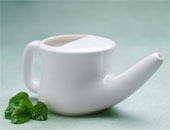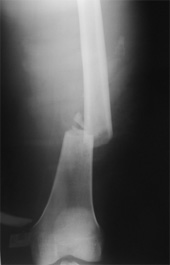January 3rd, 2012 by Lucy Hornstein, M.D. in Opinion
No Comments »

Why is it easier to talk about quality of life with patients who are dying? Why don’t we factor these considerations into the decision-making for patients with conditions that aren’t fatal?
The presence of a terminal illness serves to focus everyone’s attentions. Widespread cancer metastases? Concerns about tight blood glucose control fade away. End-stage liver disease? Blood pressure control doesn’t matter so much any more. Bony pain from prostate cancer? Narcotic and sleeping pill addiction doesn’t even occur to anyone. I find it far more problematic to deal with patients with debilitating but non-fatal conditions when treatment options are perceived as limited because of co-existing diseases that produce so-called contraindications to certain medications.
I have a patient in his mid-70s with severe pain from osteoarthritis. Several fractures and a couple of unsuccessful joint replacement surgeries haven’t helped matters. Several years ago he found that a little drug called Vioxx worked extremely well for him, reducing his pain considerably and allowing him to do pretty much watever he wanted. As we all know, however, that drug was pulled from the market because of an unacceptable increased risk of heart attacks and other untoward cardiovascular events. Interestingly, Read more »
*This blog post was originally published at Musings of a Dinosaur*
July 11th, 2011 by IsisTheScientist in Opinion, Research
No Comments »

Yesterday I went to go see my friend, the recently infrequently-mentioned Dr. Buttercup. When I first came to MRU, Dr. Buttercup was gracious enough to allow me to share lab space with him. That, coupled with our mutual love of beer and cake, meant that we saw each other quite frequently. Now that I have moved into other laboratory digs and find myself full of people, I see less of Dr. Buttercup and am the recipient of far less of his wisdom. It’s a shame. I miss that dude.
Then again, as soon as that guy received a grant score that someone told him was “fundable”, he became insufferable. Show off.
But, I digress. I saw Dr. Buttercup yesterday about a different matter and we got to discussing the idea of collaboration. He shared the notion that, as an Assistant Professor, collaboration is one of the funnest things he does. It’s also potentially one of the most dangerous because it robs your time without real reward. Still, brainstorming new experiments is fun and sometimes that additional effort on someone else’s grant pays the bills.
This made me think that the same is true for postdoc-level scientists and made me think about some collaborations I got myself into once upon a time. You see, when you’re a newly-minted, grown-up scientist, you’re on top of the world. Perhaps you start to feel like an expert in something and, perhaps, you’re enthusiastic to show the folks around you how good you are at what you do.
Don’t do it. Read more »
*This blog post was originally published at On Becoming a Domestic and Laboratory Goddess*
July 6th, 2011 by Paul Auerbach, M.D. in Health Tips
No Comments »

 Nasal irrigation is sometimes recommended to thin or remove mucous from the nose. The two most common conditions that produce mucous are upper respiratory infections (e.g., the “common cold”) and allergies. Irrigation may also be beneficial to clear out dust, dirt, and allergens, and to allow the cilia within the nose to function more efficiently. Cilia are organelles that work to move mucous and debris in the nose (among other parts of the body) to a location where they can be expelled more easily. Another benefit of nasal irrigation is that it moisturizes the mucous membranes inside the nose.
Nasal irrigation is sometimes recommended to thin or remove mucous from the nose. The two most common conditions that produce mucous are upper respiratory infections (e.g., the “common cold”) and allergies. Irrigation may also be beneficial to clear out dust, dirt, and allergens, and to allow the cilia within the nose to function more efficiently. Cilia are organelles that work to move mucous and debris in the nose (among other parts of the body) to a location where they can be expelled more easily. Another benefit of nasal irrigation is that it moisturizes the mucous membranes inside the nose.
Methods of Nasal Irrigation
Irrigation can be pulsatile or non-pulsatile (sometimes called “laminar flow”). Each type has its advocates. It is generally felt to be a safe practice so long as Read more »
This post, Everything You Wanted To Know About Nasal Irrigation, was originally published on
Healthine.com by Paul Auerbach, M.D..
June 30th, 2011 by Paul Auerbach, M.D. in Health Tips
No Comments »

 My 86 year-old mother, who is generally in good health, slipped and fell recently and suffered a fractured femur. She was unfortunate to have suffered the accident, but had the good fortune to be discovered quickly, treated promptly and well by the paramedics who responded to her, and then to have a swift and skillful operation by an orthopedic surgeon to repair the fracture. Almost miraculously, she was standing upright (with a considerable amount of pain) the next day and had begun the rehabilitation process.
My 86 year-old mother, who is generally in good health, slipped and fell recently and suffered a fractured femur. She was unfortunate to have suffered the accident, but had the good fortune to be discovered quickly, treated promptly and well by the paramedics who responded to her, and then to have a swift and skillful operation by an orthopedic surgeon to repair the fracture. Almost miraculously, she was standing upright (with a considerable amount of pain) the next day and had begun the rehabilitation process.
At her age—indeed at any age—a fractured femur is a very significant injury. This past year, I have learned of friends and others who have suffered falls and broken their legs, ankles, or backs, as well as others who suffered “pathological fractures.” The latter group had the bones break from normal daily stresses, without a traumatic incident, because the bones were weak and/or osteoporotic. More than a few of these injuries occurred outdoors, associated with stumbles on the trail or falls.
All of this highlights features of an excellent review article that was published this past year in the New England Journal of Medicine. Authored by Murray Favus, MD, it is entitled “Biphosphonates for Osteoporosis” (New England Journal of Medicine 2010;363:2027-35). Anyone who is contemplating taking or administering this therapy would benefit from reading this article. Read more »
This post, Osteoporosis Treatment With Bisphosphonates: Is Exercise Good Or Dangerous?, was originally published on
Healthine.com by Paul Auerbach, M.D..
May 30th, 2011 by Mark Crislip, M.D. in Health Tips
No Comments »

It is hard to get infected. The immune system is robust and has a multitude of interlinking defenses that are extremely efficient in beating off most pathogens. Most of the time.
Fortunately, it is a minority of microbes that have evolved to be virulent in humans. Bacteremia is common with our own microbiome. When you brush or floss, bacteria leak into the blood stream:
We identified oral bacterial species in blood cultures following single-tooth extraction and tooth brushing. Sequence analysis of 16S rRNA genes identified 98 different bacterial species recovered from 151 bacteremic subjects. Of interest, 48 of the isolates represented 19 novel species of Prevotella, Fusobacterium, Streptococcus, Actinomyces, Capnocytophaga, Selenomonas, and Veillonella.
but with a good immune system, low virulence bacteria and no place to go, unfortunately the bacteria rarely cause infections.
Even heroin users rarely get infection. Heroin is a rich melange of bacteria and, on occasion, yeasts (I hate to say contaminated, since avoiding microbes is hardly a worry of heroin manufacturers), and the water used for injection is rarely sterile, yet infections are relatively rare despite the filth in which many heroin users exist.
I used to be somewhat fatalistic about hospital acquired infections. However, as the institutions in which I have worked have proven, almost all infections in the hospital are preventable if the institutions aggressively pursue high standards of care.
There are many systems in place in society to prevent infections: flush toilets, good nutrition, public health, vaccines, antibiotics, good hygiene, and an understanding of disease epidemiology, and I suspect people forget there are bugs out there that are pathogenic, just waiting to sicken and kill us. At least a couple of times a year I see patients come into the hospital, previously healthy, who rapidly die of acute infections. But for most people, most of the time, it takes a lot of effort to get an infection.
From my perspective we are Charlie Chaplain on skates , mostly unaware of the infections that awaits us if we do something silly, Read more »
*This blog post was originally published at Science-Based Medicine*





 Nasal irrigation is sometimes recommended to thin or remove mucous from the nose. The two most common conditions that produce mucous are upper respiratory infections (e.g., the “common cold”) and allergies. Irrigation may also be beneficial to clear out dust, dirt, and allergens, and to allow the cilia within the nose to function more efficiently. Cilia are organelles that work to move mucous and debris in the nose (among other parts of the body) to a location where they can be expelled more easily. Another benefit of nasal irrigation is that it moisturizes the mucous membranes inside the nose.
Nasal irrigation is sometimes recommended to thin or remove mucous from the nose. The two most common conditions that produce mucous are upper respiratory infections (e.g., the “common cold”) and allergies. Irrigation may also be beneficial to clear out dust, dirt, and allergens, and to allow the cilia within the nose to function more efficiently. Cilia are organelles that work to move mucous and debris in the nose (among other parts of the body) to a location where they can be expelled more easily. Another benefit of nasal irrigation is that it moisturizes the mucous membranes inside the nose. My 86 year-old mother, who is generally in good health, slipped and fell recently and suffered a fractured femur. She was unfortunate to have suffered the accident, but had the good fortune to be discovered quickly, treated promptly and well by the paramedics who responded to her, and then to have a swift and skillful operation by an orthopedic surgeon to repair the fracture. Almost miraculously, she was standing upright (with a considerable amount of pain) the next day and had begun the rehabilitation process.
My 86 year-old mother, who is generally in good health, slipped and fell recently and suffered a fractured femur. She was unfortunate to have suffered the accident, but had the good fortune to be discovered quickly, treated promptly and well by the paramedics who responded to her, and then to have a swift and skillful operation by an orthopedic surgeon to repair the fracture. Almost miraculously, she was standing upright (with a considerable amount of pain) the next day and had begun the rehabilitation process.








